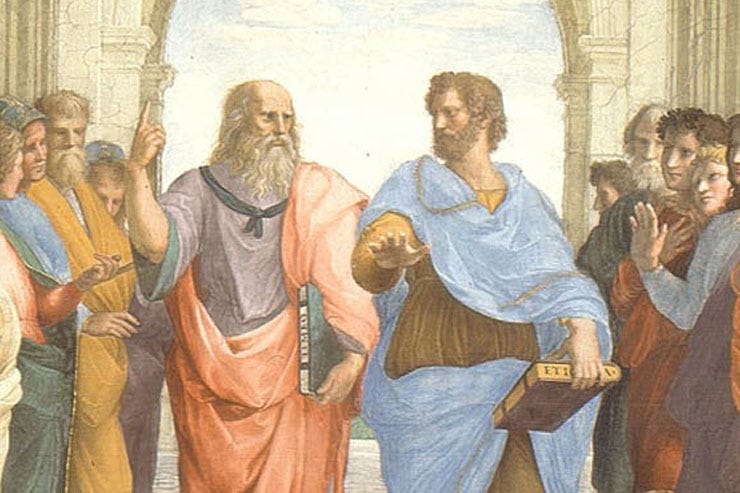Modern Morality Prioritizes Avoiding Evil
Over pursing the good, the beautiful, and the true
As David Foster Wallace once wrote, everyone worships something. Everyone believes in something. Not just spiritually, but practically: they need to have a hierarchy of values with which they can prioritize and make decisions.
For most of history, people have believed in their conceptions of “the good”: God, family, country, the good, the beautiful, and the true.
Modern morality, however, is not about pursuing the good, the beautiful, or the true. It is about eliminating inequality and intolerance, progressing toward ever greater equality and freedom, and fulfilling desires in our collective pursuit of happiness.
But maximizing freedom, equality, and fulfillment of desires has nothing to do with the goods like God, family, and country we mentioned above. In fact, they are in tension with these goods because the latter are fundamentally unequal and discriminatory. God is discriminatory because some people are closer to God and others farther. Country and family are discriminatory because some people belong to a particular nation or family and others don’t. Excellence is discriminatory because some people and achievements are more excellent and others less. And so forth.
So how do people find the highest good given the highest goods are discriminatory? Well, they invert. Instead of focusing on pursuing the highest good, they focus on the most extreme negatives of the highest goods, turn them into the greatest evil, and make opposition to those evils the greatest good. In this way, modern morality is a “negative morality”. It takes some ideas introduced by Christianity and extends them to their logical conclusion.
This takes the form of opposing fascism, sexism, racism, religious fundamentalism, etc. While this roots out the most extreme abuses of group formation, it also calls into suspicion freedom of association more broadly, which is why (to give just a few examples) the nuclear family is problematic, why nationalism is bad, why men lifting weights has white supremacist origins, and why even birdwatchers are complicit in racism. God, country, and family became seen as a possible threat, since they could turn into religious fundamentalism, nationalism, and racism respectively.
It’s worth noting how fundamental this inversion of values is: Traditional morality held that the good, true, and beautiful were our goals, and that evil was the absence of those. Conversely, modern morality holds that equality and non-discrimination (e.g. social justice) are our goals, and the good, the true, and the beautiful are antithetical by their very definition. Not because they don’t matter, but because they are bestowed unequally. People would rather have a more equitable society than a richer one. They’d rather have a society that raises the floor even if it lowers the ceiling rather than one that raises the ceiling even if it raises the floor (if it’s not equitable).
While traditional morality identifies the highest good and worships it, modern morality identifies the deepest evil, and curses it. Modern morality holds that it’s more important to avoid evil than pursue the good, the beautiful, and the true. That’s why in the West today you can’t be penalized for saying God isn’t real, but in many places you can lose your job for saying systemic racism isn’t real.
In traditional morality, you have saints, scriptures, and sacraments. Modern morality doesn’t really have saints. Instead you have demons like Trump, Kanye, and Tate. It’s hard to come up with opposites of those demons. Barack Obama, Greta Thunberg? They’re demonized by half the population too. In a culture obsessed with avoiding evil as opposed to pursuing the good, it would make sense that we focus on demons rather than saints.
Many religions strive to reach a state where they are undifferentiated from God, where there is no “self” separate from God. Modern morality, by contrast, does the opposite: It strips away any unchosen bonds that could influence the self, like religion, nationalism, family. It eliminates evil at all costs, even if that means mitigating the good because, applied to the extreme, it might contain evil. When eliminating all evil is the objective function, you get rid of a lot of Good in the process.
And this explains our malaise. A culture that prioritizes avoiding evil will not be able to pursue the good. A culture that prioritizes raising the floor will not be able raise the ceiling. A culture that is defined by a negative morality rather than a positive morality creates a spiritual gap that needs to be filled. Culture wars happen when no real culture remains.


By modern morality, do you mean liberalism? The title of this article is a copout. Liberalism is merely being taken to its natural conclusion. Welcome to the world you wanted!
Interesting think piece. I'm not sure I can concur with all your closing paragraph/conclusions, but I'll ponder. Does seem to have a USA-centric flavor, though, much like de Tocqueville in its focus on demonization in politics.
Are you making the case that all parties in our contemporary stew (left, right, whatever) have subscribed to the negative morality formulation? I might buy that, but I'm sure some culture warriors in the current scrum would beg to differ.